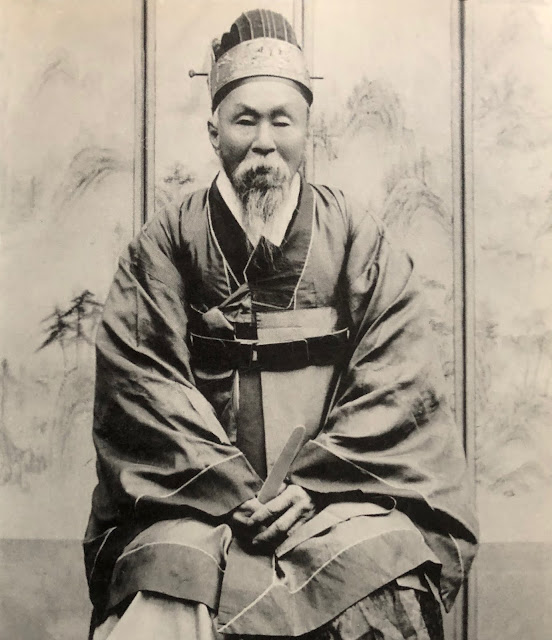National Classical Music Institute conducted by Kim Ki Soo – Jigu Records (Seoul), (3 LPs)
This collection of discs is an
excellent introduction to Gugak (국악), the rich and fascinating traditional
music of Korea, which encompasses folk and court music, poetic songs, and
religious shamanistic/animist and Buddhist music.
According to Jungeun Oh, "A
Korean traditional orchestra has a similar organization to that of Western
orchestras. Like a Western symphony orchestra, the new type of Korean traditional
orchestra requires a conductor… KiSoo Kim (1917-1986) composed the first new
traditional orchestra piece, HwangHwaManNyunJiKok, in 1940... After Kim composed this piece, Korean new traditional music did not
show real signs of vitalization until the 1960’s. In the 1960’s, when its
composers became more active, Korean new traditional music was one of the
spheres where dramatic modernizing efforts were taking place."*
The expressive and abstract music
here features a variety of musical formats, from instrumental solos (C3, D1,
D2) to royal court Orchestra (B1), Confucian Ceremonial Music (C1), and poetry (E1, F1):
Cette collection de trois disques est une excellente introduction au
Gugak (국악), la riche et fascinante musique traditionnelle coréenne, qui englobe
la musique folklorique et la musique de cour, les chansons poétiques ainsi que
les musiques religieuses chamaniques/animistes et bouddhistes.
Selon Jungeun Oh, « un orchestre traditionnel coréen a une organisation similaire à celle des orchestres occidentaux. À l'instar des orchestres symphoniques occidentaux, les nouveaux orchestres traditionnels coréens sont dirigés par un chef d'orchestre… KiSoo Kim (1917-1986) fut le premier à composer un morceau néo-traditionnel orchestral HwangHwaManNyunJiKok, en 1940.... Mais la nouvelle musique traditionnelle coréenne ne connaîtra un véritable essor qu'à partir des années 1960, lorsqu'elle entama une modernisation spectaculaire. »*
Ces musiques expressives et abstraites présentent une grande variété de formats musicaux, allant de solos instrumentaux (C3, D1, D2) à un orchestre de cour royale (B1), une cérémonie confucéenne (C1) à de la poésie (E1, F1).
Selon Jungeun Oh, « un orchestre traditionnel coréen a une organisation similaire à celle des orchestres occidentaux. À l'instar des orchestres symphoniques occidentaux, les nouveaux orchestres traditionnels coréens sont dirigés par un chef d'orchestre… KiSoo Kim (1917-1986) fut le premier à composer un morceau néo-traditionnel orchestral HwangHwaManNyunJiKok, en 1940.... Mais la nouvelle musique traditionnelle coréenne ne connaîtra un véritable essor qu'à partir des années 1960, lorsqu'elle entama une modernisation spectaculaire. »*
Ces musiques expressives et abstraites présentent une grande variété de formats musicaux, allant de solos instrumentaux (C3, D1, D2) à un orchestre de cour royale (B1), une cérémonie confucéenne (C1) à de la poésie (E1, F1).
A1 Woodwind Music – Gyeong Pung
Nyeon
A2 Chamber Music – Cheon Nyeon
Man Se
A3 Trio – Heon Cheon Soo
B1 Royal Court Orchestra – Nak
Yang Choon
B2 Woodwind Music – Ham Ryeong
Ji Gok
B3 Chamber Music – Yeo Min Rak
C1 Confucian Ceremonial Music –
Eung An Ji Ak
C2 Royal Ancestral Shrine –
Jeon Pye Hee Moon
C3 Daegeum Bamboo Transverse
Flute Solo – Cheong Seong Ja Jin Han Ip
D1 Piri Double Reed Solo – San
Jo
D2 Tungso Vertical Bamboo Flute
Solo – San Jo
E1 Gasa (poetry) – Soo Yang San
Ga
F1 Sijo (poetry) – Yeok Eum Ji
Reum Si Jo
F2 Gagok (Vocal) – U Jo Sam Soo
Some 25 years ago, I met a contemporary classical music composer with a remarkable collection of LPs. He generously let me take out all the records I wanted to record them at home. In addition to precious Karlheinz Stockhausen and Minimal music LPs, etc., I found a few traditional East Asian records, including this 3 LP gem from Korea. I’ve been looking in vain for a copy since and have yet to even find an online trace of it. If by chance someone has this album, I would much appreciate including a scan of the front cover and more info on the music in this post.
Some 25 years ago, I met a contemporary classical music composer with a remarkable collection of LPs. He generously let me take out all the records I wanted to record them at home. In addition to precious Karlheinz Stockhausen and Minimal music LPs, etc., I found a few traditional East Asian records, including this 3 LP gem from Korea. I’ve been looking in vain for a copy since and have yet to even find an online trace of it. If by chance someone has this album, I would much appreciate including a scan of the front cover and more info on the music in this post.
Photographs are from L'Art Coréen au Musée Guimet by Pierre Cambon, RMN, 2001, Visages d'Asie by Bernard Dupaigne, Hazan, 2001, and Primitivism in 20th Century Art: Affinity of the Tribal and the Modern by William Rubin, MoMA, 1987:
Thousand-armed bodhisattva Avalokitesvara, Chonsu Kwanum Posal (above):
Mask:
Korean dignitary, c. 1900:
Roadside Divinity (291 cm/9.5 ft):




Love it. Traditional korean music is incredibly interesting and diverse. I was pretty blown away when I heard Sanjo for the first time. Was hoping that you'd post something from Korea at some point :)
ReplyDeleteTeşekkürler...
ReplyDeleteThis is so beautiful. It makes my heart and eyes cry and laugh at the same time. I may have a mental breakdown right now or something like that, but there are actually tears running down my face.
ReplyDelete